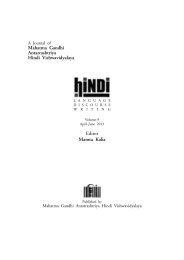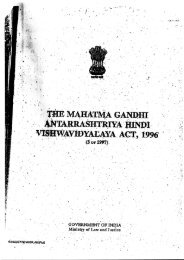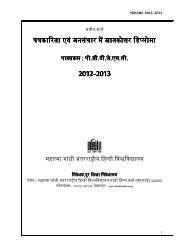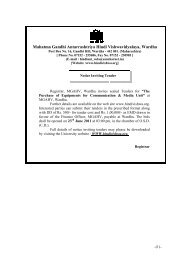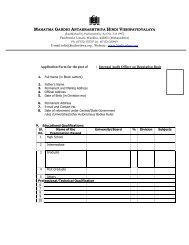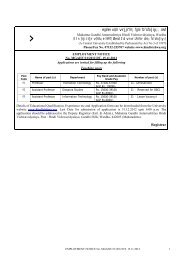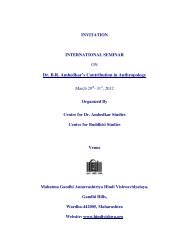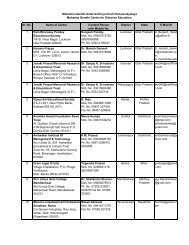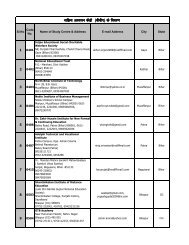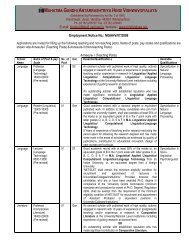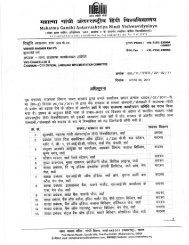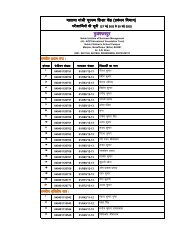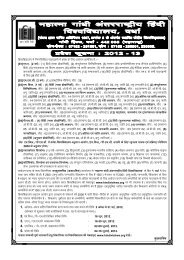A Journal of Mahatma Gandhi Antarrashtriya Hindi Vishwavidyalaya
A Journal of Mahatma Gandhi Antarrashtriya Hindi Vishwavidyalaya
A Journal of Mahatma Gandhi Antarrashtriya Hindi Vishwavidyalaya
You also want an ePaper? Increase the reach of your titles
YUMPU automatically turns print PDFs into web optimized ePapers that Google loves.
which were struggling to assert their identity.<br />
Urdu emerged as the national language<br />
<strong>of</strong> Pakistan which was not spoken in any<br />
<strong>of</strong> its regions . Urdu was the language<br />
<strong>of</strong> those refugees who had been displaced<br />
from different parts <strong>of</strong> North India and<br />
had reached Pakistan and were called<br />
Mohajirs.<br />
Why was Urdu made into a national<br />
language? The reason is very obvious. By<br />
that time, Urdu had been accepted as<br />
a marker <strong>of</strong> Indian Islamic identity. Despite<br />
the fact that a large number <strong>of</strong> non-Muslims-particularly<br />
Hindus had a major<br />
contribution towards its development –<br />
it was believed that Urdu was the language<br />
<strong>of</strong> the Muslims and it be made the national<br />
language <strong>of</strong> the country- especially created<br />
for the Muslims. It was quite similar to<br />
the situation regarding <strong>Hindi</strong> which had<br />
become a mark <strong>of</strong> identity for the Hindus.<br />
The division <strong>of</strong> the nation was based on<br />
two-nation theory based on religion, and<br />
despite the fact that the very concept<br />
<strong>of</strong> the division <strong>of</strong> a nation on the basis<br />
<strong>of</strong> religion was highly unrealistic and full<br />
<strong>of</strong> mockery, a lot <strong>of</strong> people believed in<br />
this concept and at least one nation came<br />
into being on its foundation. It was only<br />
after twenty-five years that the two-nation<br />
theory proved to be disastrous after the<br />
creation <strong>of</strong> Bangladesh. In fact, in 1947<br />
itself, after India became a secular republic<br />
rather than a Hindu nation, there were<br />
question marks on its legitimacy and the<br />
two-nation theory became a debatable issue.<br />
Religious and secular nations seek different<br />
solutions for the challenges that beset them.<br />
This is the difference which is seen in<br />
these young nations, and in the methods<br />
they employ to solve the problem <strong>of</strong> the<br />
language.<br />
Jinnah went to Dacca in 1948. His<br />
speech delivered to the students <strong>of</strong> the<br />
Dacca University is the biggest example<br />
<strong>of</strong> the intolerance <strong>of</strong> a nation based on<br />
religion. It is a universal fact that the<br />
insistence <strong>of</strong> the Bengalis <strong>of</strong> East Pakistan,<br />
regarding their language was markedly<br />
different from any other language nationalities–Punjabi,<br />
Sindhi, Baluchi or Pashto.<br />
What was more important than this was<br />
that Bengali was by far the most widely<br />
spoken language in comparison to any<br />
other language in Pakistan, but it was also<br />
the language <strong>of</strong> more than half <strong>of</strong> its<br />
population. Language, for them was not<br />
just a medium <strong>of</strong> self-expression, but more<br />
than this it was responsible for the identity<br />
formation in a multinational society. Apart<br />
from this, in a fast emerging nascent nation<br />
there was political space, and government<br />
jobs were being procured on the basis<br />
<strong>of</strong> language only. In this context, Jinnah's<br />
assertion in front <strong>of</strong> those students in<br />
Dacca, that only Urdu will be the contact<br />
language in Pakistan and that it will be<br />
the medium to impart higher education<br />
as well, proved to be the biggest blow<br />
to the process <strong>of</strong> nation building. The<br />
64 :: January-March 2012



